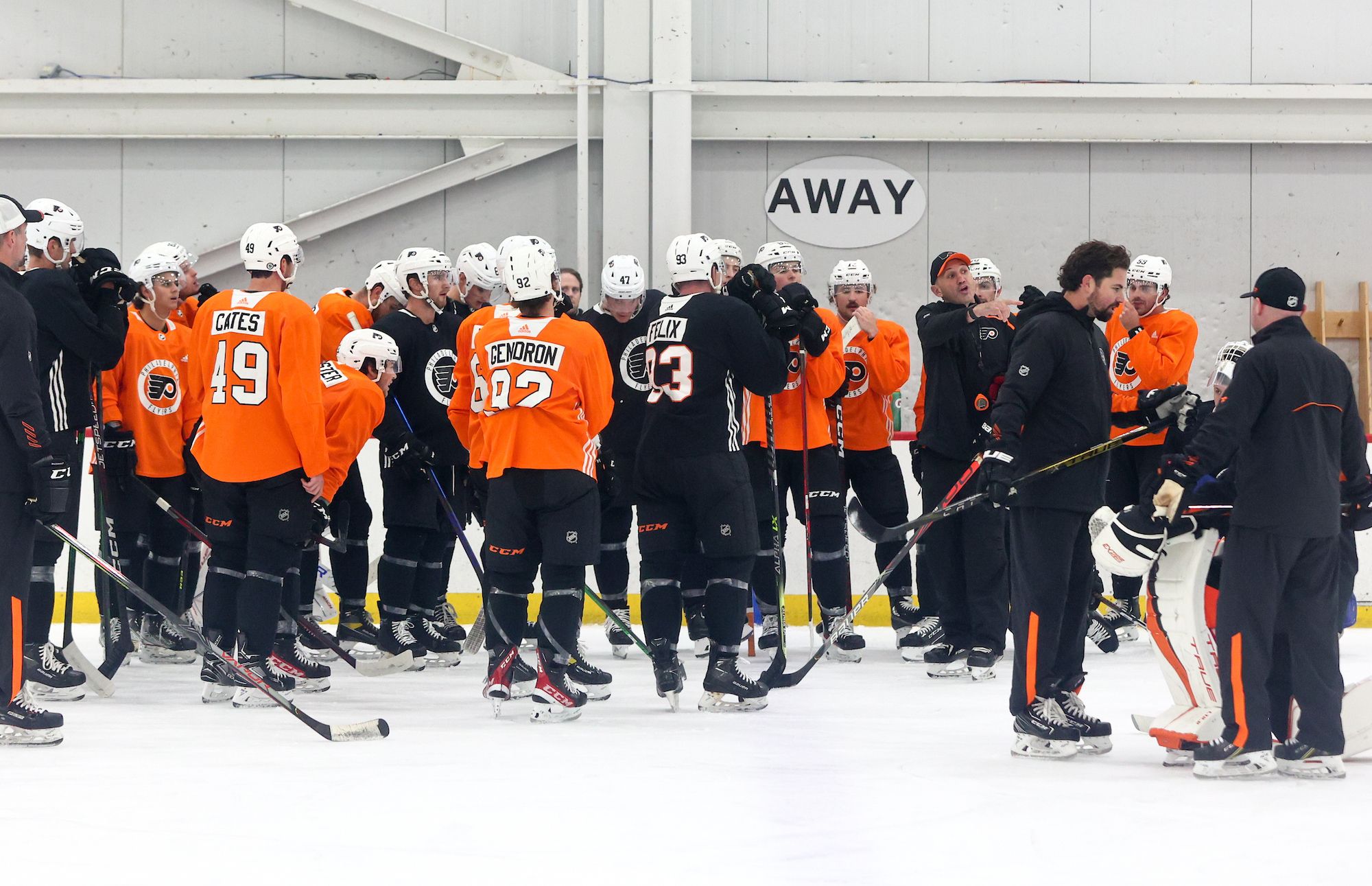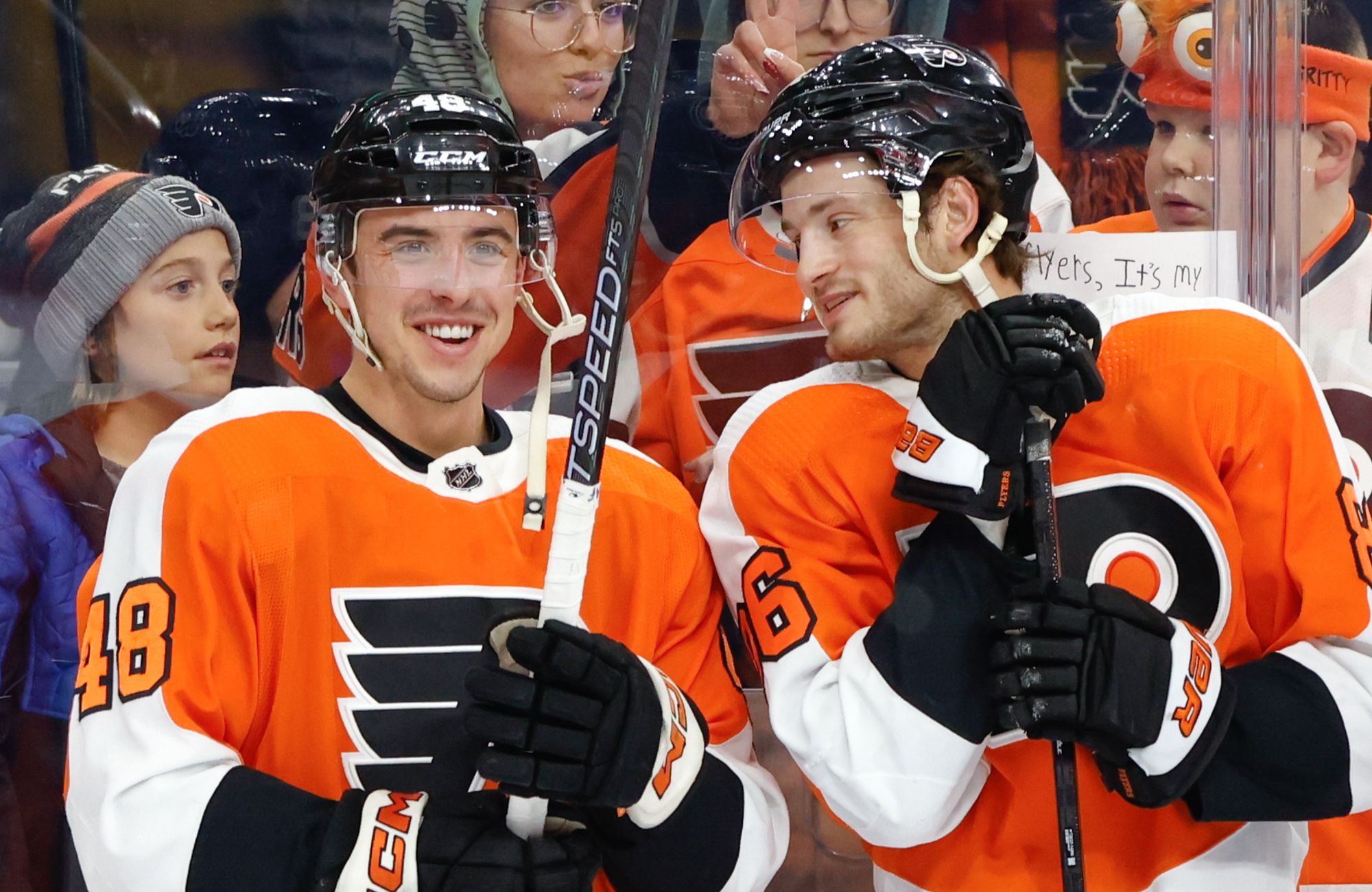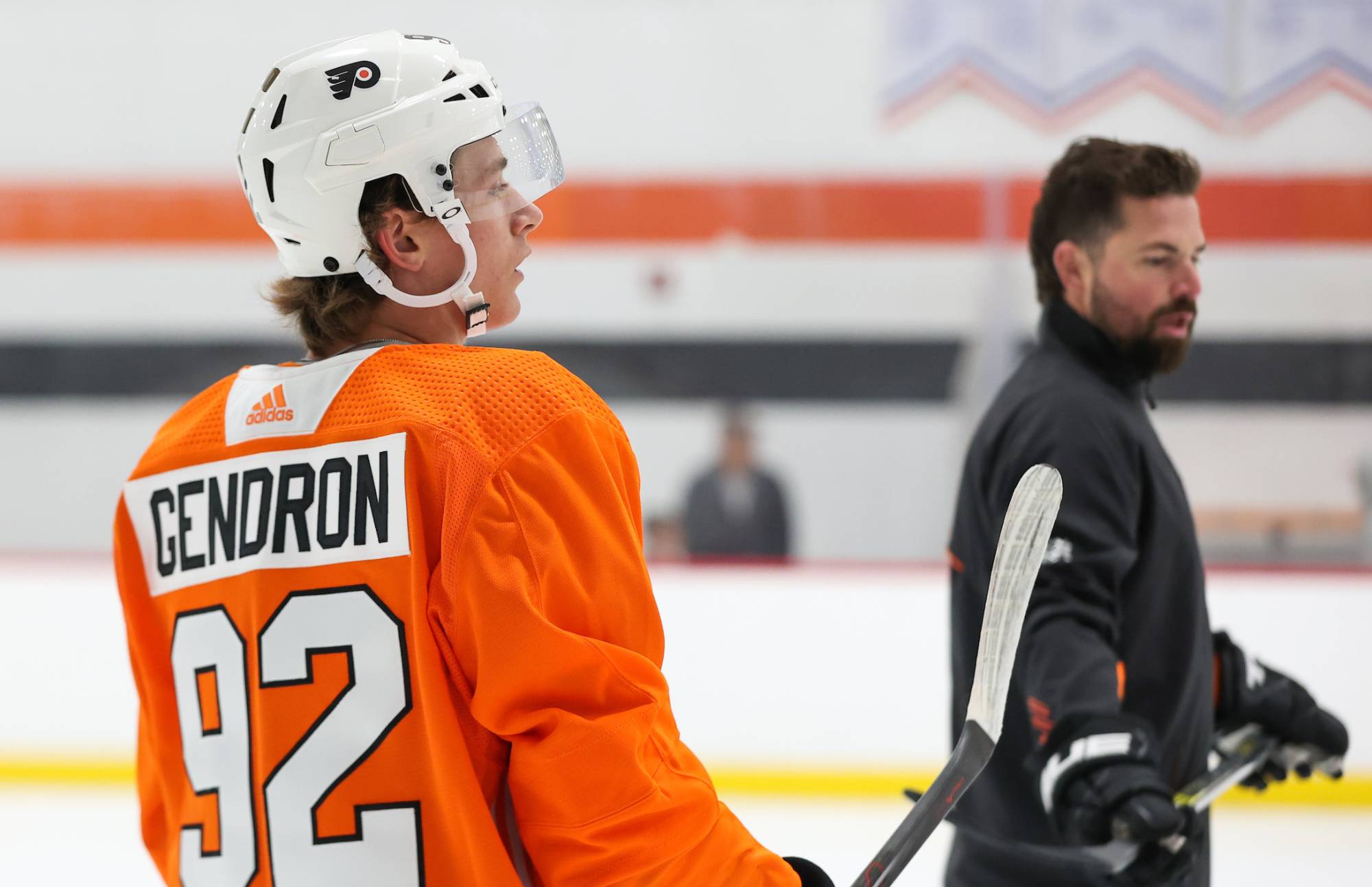It’s August, we’re cranky, the Flyers haven’t won a playoff series in seven years, and there’s a new story that’s given us as a fanbase reason to feel insecure about ourselves, so let’s just buckle up and get right down to some talking.
The story in question is brought to us by current TSN Senior Hockey Reporter and former Daily News Flyers beat writer Frank Seravalli, who told the tale on Crossing Broad’s Snow The Goalie podcast. Here’s the money quote, very lightly edited for clarity:
I don’t understand why they felt the need to go out and spend a pick in order to go do this. I don’t think there was a team that would have come close to the Flyers’ number, because if there were, Kevin Hayes would have just waited until July 1, and I have that on good authority.
I was with a current NHL player, the night before Game 7, in Boston, who, like, five minutes before seeing me, ran into Kevin Hayes, y’know, outside somewhere in downtown Boston, which is obviously [Hayes’] hometown, and he goes “oh, yeah, I just ran into Kevin Hayes,” and he said Kevin Hayes told him the only way he’s going to the Flyers is if the Flyers overpaid to get him.
And … how much did they overpay by? I mean … it’s hard to answer that, specifically, but I would say at least six to seven hundred thousand dollars a year, times seven years.
There’s a mix of reporting, opinion, and conjecture in there, but the gist of what Seravalli is saying boils down to this: new Flyers center Kevin Hayes wouldn’t have come to Philadelphia if not for the Flyers paying more than market rate to get him, and they gave up a pick just for the right to do that. There’s been at least one public dispute of elements of the story by former NHLer and current Barstool Sports podcast host Ryan Whitney, apparently a friend of Hayes’, but Seravalli is a reputable reporter and is almost certainly not making the whole thing up. So for now, let’s assume this story is true and it happened exactly as Seravalli described it, and that that story perfectly and accurately represents Hayes’ mindset throughout the entire process.
In which case … duh?
Hayes was, by most accounts, the second or third-best unrestricted free agent center expected to change teams heading into the summer. (Matt Duchene is probably better than him. As is Joe Pavelski, but most expected him to stay in San Jose until he left.) He’s 27, so this is his best chance to get paid. He had no particular personal ties to the Flyers or Philadelphia; he’s a Boston native who was drafted by Chicago and came up into the league with the Rangers. And he was coming off of the best year of his NHL career.
That’s a guy who has every reason on Earth to wait until July 1 to hit free agency. And, oh-by-the-way, we have a previous example of him not signing with the team that has his contract rights. Of course the Flyers had to overpay him to get him to sign before July 1.
The thing is, even with the qualifiers given above, this situation isn’t even that unique to Hayes. Think of any guy whose rights were traded before July 1 only to agree to a deal with his new team before free agency. Aren’t most of those contracts overpays? Christian Ehrhoff? Scott Darling? Oh, maybe also the guy the Flyers will be paying until 2027?
Which is to say that what Seravalli is telling us is most likely true, because it should be fairly obvious to anyone that is paying attention that Hayes signed in Philadelphia primarily for the money. In fact, to some of us (ho, hum), it was fairly obvious from the moment Hayes was traded that the only way he was going to sign with the Flyers before July 1 was if he was overpaid. Sure, there are probably other things about the organization that Hayes liked — no matter the money, he wouldn’t have signed here if he saw nothing else interesting going on. But the money pushed it over the finish line, and no one should be kidding themselves about that.
(Two quick sidebars before continuing:
- Frankly, if “overpaying” is only a matter of six or seven hundred thousand dollars a year, as Seravalli suggests? For a guy who you expect to play in your top-6? You’d always like to avoid overpaying, of course, but if you saw Hayes as a $6.5 million per year player, $7.14 million is 10% more than that. That’s an amount you can stomach. Guys that are worth more money are worth more money.
- None of this is, in the slightest, meant to be a knock on Hayes. One should never, ever begrudge any athlete trying to go get that paper.
Anywho.)
Now, if this was just a conversation about the wisdom (or lack thereof) of trading assets for players’ UFA rights, or about whether Hayes as a player is a good second-line center worth something even close to that deal, or about big names in unrestricted free agency in general, that would be one thing. I am not, for instance, oblivious to the fact that the three examples I listed above are all guys who were bought out of their contracts well before they ended. There are, in my opinion, fairly valid reasons to question Hayes’ deal on some of those fronts and others.
But it feels like the loudest complaints that have come out of Flyers Twitter and the angrier corners of the fanbase since Seravalli told this story have had a different sort of tone to them.
To some Flyers fans, the effective confirmation that Hayes “only came here because the Flyers overpaid him” has become the latest data point suggesting that the Flyers have become a big joke to the NHL and everyone involved with it. That this once-proud franchise that was one of the envies of the league is now a laughingstock that can’t attract anyone without seeming desperate. It’s the second time this offseason that this conversation has really widely been had, the first being the day after the season ended when Joel Quenneville was announced as the next head coach of the Florida Panthers (and not the Flyers), and it was the kind of thing you heard said last season when the Flyers failed (not for a lack of trying) to get a meeting with John Tavares. That the Flyers, who back in the good old days got whatever and whoever they wanted, now can’t get anything because they’re just the damn worst.
And that seems detached from reality. It seems like an overreaction to what has admittedly and obviously been a fairly drab past seven years of Flyers hockey.
Here’s what’s true: the Flyers, in their current state, aren’t special. The Flyers aren’t exceptional. The Flyers aren’t one of the premier teams and organizations in the National Hockey League in the eyes of its observers. They don’t have this gravitational pull that convinces everyone involved in the game of hockey that this is the place to be.
There are two issues with taking that fairly evident observation and turning it into a stinging and unique rebuke of the organization in its current state.
The first: who does have that kind of pull at this point? How many of the NHL’s 31 teams are that? Right now? Tampa, probably. Lack of Cups (in this recent-past era) aside, you tend to get some admiration when you’re consistently one of the best teams in hockey, you play a fun style, and you’re in a state with good weather and no income tax. Toronto is like that for a lot of Canadian players, sure, particularly now that they’re a good team again. And as much as we may hate to admit it, the Rangers inexplicably have a similar influence for a lot of American players. (Just ask Kevin Hayes!)
Other than them … who are these teams that are magically signing players and bringing in coaches Because Of Who They Are? Every so often, teams will pull off the kind of coup that it feels like the Flyers haven’t had in a while. In the context of this conversation and this offseason, Florida bringing in Quenneville comes to mind. Yet those, more than anything else, are reminders that there are so many things that factor into a person’s decision on where they want to spend their time. The number of guys who sign with an organization Because Of Who They Are is, frankly, very small, and expecting folks to do that with the Flyers is a waste of time and energy.
(Also, let’s set aside the fact that we’re having this conversation one year after the Flyers signed the best winger on the free agent market, because apparently that doesn’t count as a sign of Being An Attractive Organization for some reason.)
Yet there’s a lot of prevailing wisdom out there that this is just … how it used to be for the Flyers, which brings me to my second objection here: the Flyers haven’t lost their luster when it comes to bringing in top talent because that luster never really existed in the first place.
That’s not to say the Flyers don’t have a proud history that’s gone by the wayside in recent years. You don’t need me to remind you it’s been seven years since the team’s last playoff series win. And prior to this decade, the Flyers had never gone more than five straight years without making the conference finals. It’s now been nine years since the last time the Flyers got to that mark. On the ice, things have never been as futile as they have been lately.
There are a number of reasons for that. A near-decade’s worth of bad drafting (helped in part by a lack of first-round picks) between 2004 and 2010 that left the team without good young depth. Poor personnel decisions at the early part of this decade, especially on defense, that left the team with a middling roster and without any cap flexibility. Bad luck (see: Pronger, Chris). Young guys taking a bit longer to become what we thought they could become, or just not becoming that at all. Oh, and goaltending. Bad goaltending.
Anyone paying attention in the early part of this decade knew we were in for a few years of pain and stagnation. And Ron Hextall came in, recognized that, and — in what was, despite some revisionist history that’s come up in the months since his dismissal, an overwhelmingly popular mindset to the fans at the time — stayed put without trying to patch together quick fixes that would probably make things worse long-term. Whether because he literally couldn’t due to cap problems or because he didn’t think it was the right way to build a team, he didn’t really try to have the Flyers be that team that got whatever it wanted. (And then, once he did, the team signed James van Riemsdyk.)
That extended period of inaction, in hand with the mediocre hockey that came with it, solidified the Flyers as Not A Premier Destination, as we’ve talked about. Which, sure, I’d like the Flyers to be a premier destination in the way a very small number of teams are, but the target to hit there is extremely small and assuming that your team is a disastrous failure for not hitting it is setting yourself up for disappointment. Very few teams are “premier destinations”, even teams that win.
And that’s where the conflation has happened. There’s this mindset out there that the Flyers — who used to make a lot of flashy moves, both before the salary cap and in its early years — were that premier destination, and the proof is in the fact that the team used to win, and now that they don’t win they aren’t that premier destination. That’s not how this works.
Back in April, mere days after Quenneville made his move to Florida, our pals on BSH Radio had a chat about this very topic that I would highly recommend. In response to one of our hosts — director of fun and games Bill Matz — voicing essentially all of the complaints I’ve attempted to argue against above, another one of our hosts — The Athletic’s Charlie O’Connor — had the following to say, in a soliloquy that is slightly NSFW at moments but is still stated much more eloquently than I could put it (around the 18-minute mark at the above link if you’d like to listen along, but again, you might want some headphones first):
The idea that the Flyers literally, with every single free agent and every single coach and every single thing they ever wanted to do under Ed Snider, literally just smacked their d*** on the table and were like “you’re coming here” and they were like “OK, Mr. Snider” — that’s not what f***ing happened! The Flyers didn’t get everything! We’ve created this myth in our heads that the Flyers literally got everything they ever wanted every single year. They didn’t get every free agent. They didn’t get every coach. They got a lot of what they wanted because they had a lot of money and there wasn’t a salary cap. But it wasn’t that they got everything. No one gets everything.
And Flyers fans have convinced themselves that … some Flyers fans, they live in a dream world where they think that the Flyers 20 years ago, 25 years ago, literally snapped their fingers and whatever they wanted to happen happened except a Stanley Cup. And that’s not what happened. That’s not how anything happens. That’s a fantasy world.
Let’s tie this all full circle, then.
Let’s say I’m wrong. Let’s say there was a time in the not-too-distant past that the Flyers could just make whoever they wanted to show up here show up here. That the Flyers were the place to be among guys who had their choice of destination.
If there’s one offseason that captures that, surely it’s the 2007 offseason, right? Paul Holmgren’s first summer in charge of things here. Holmgren — whatever faults you want to bring up about his time in Philadelphia in general — was outstanding that first year on the job, on the heels of the unquestioned worst season in franchise history. And highlighting the moves he made that summer were a trio of free signings that would shape the next half-decade of Flyers hockey: Scott Hartnell, Kimmo Timonen, and Danny Briere.
You know how Paul Holmgren got those guys (two of whom he acquired via a free-agent-rights trade) to sign with the Flyers? He overpaid them.
Yep. He sure did. I love all three of those men with my entire orange and black heart, but take a look at what they signed for relative to the salary cap that season, put it in the context of the $81.5 million cap hit we play under now (and that Mr. Overpay Me Hayes himself signed under), and tell me with a straight face that those contracts aren’t overpayments for what those guys were:
Kimmo Timonen was awesome. An outstanding player, and such a good guy that he got basically our entire fanbase to root for him to win a Stanley Cup on the team that took our best chance at one in this millennium after the Flyers traded him. But if you dropped prime 32-year old Kimmo Timonen into this summer’s free agent market, does he really get eight figures per year? Probably not. Because the Flyers overpaid him that summer. Just like they did with Hartnell (who, frankly, was probably not a better player at the time than Hayes is now) and Briere (who was great, but that great?).
Yet very few people sat around and talked then about how the Flyers are so desperate and pathetic and unnoteworthy that they need to overpay to get good players. They talked about how exciting it was that the Flyers were back, and sure enough, the team made it to the Conference Final the next year.
All of which is to say this: consider yourself unfortunate to be living through the least prosperous era of Flyers history. Get angry and call for folks to lose their jobs if the team doesn’t win a playoff series this year. Question the fact that the folks upstairs went out and spent a ton of money on guys that may not even be big upgrades. Don’t be happy with how things have been, because you shouldn’t be.
But you can do or not do all of those things without creating a reality that was never actually real.









